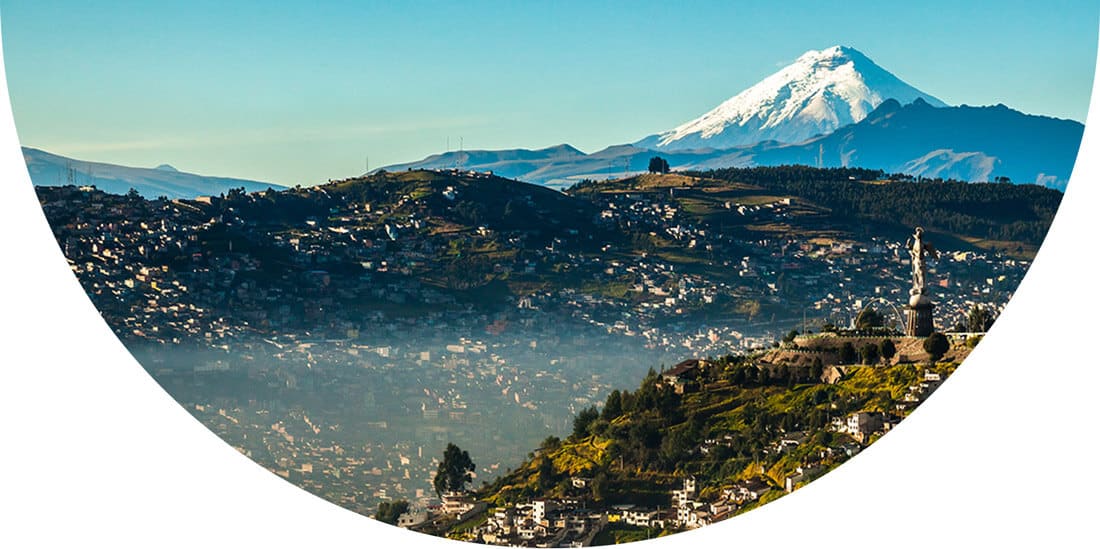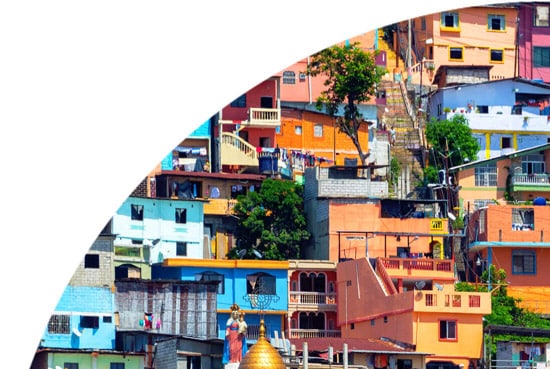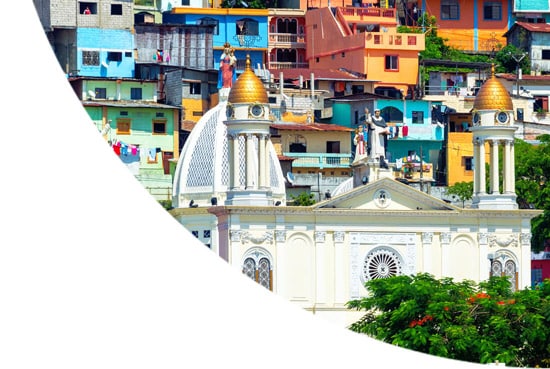West Nile virus (WNV) is spread by mosquitoes in many countries. There are usually no symptoms, although some people develop mild flu-like symptoms, nausea and skin rash. The virus is not contagious and should get better without any treatment.


Travel Vaccinations for Ecuador
Recommended Vaccines for Ecuador
The level of protection needed depends on your medical history and travel itinerary. Book now to get a personalised recommendation from our specialist travel nurses. The consultation costs £20 plus any vaccines you decide to take.
Flexible appointments with no upfront payment
Book Now
Destination Information for Ecuador
Ecuador straddles the equator on the West coast of South America, bordered by Colombia and Peru. It is known to be the most biodiverse country in the world, home to a huge number of species of hummingbirds and orchids, as well as a plethora of other incredible and rare wildlife. The landscape of Ecuador encompasses the highlands of the Andes, areas of Amazonian rainforest and the famously popular Galapagos Islands. The country includes the world’s highest active volcano, Cotopaxi, in the centre of the country.
Ecuador is divided into three quite distinct regions: Costa, Sierra and Oriente. Costa is the coast: hot, dry and filled with sandy beaches. Sierra is the centre of Ecuador: a mountainous region with a number of old colonial towns and local markets, perfect for travellers to use as a base. The lowlands of Oriente are the best place for wildlife watching. For visitors who want to explore the rainforest and jungle in Ecuador, the Cuyabeno Wildlife Reserve is a good choice of destination.
The capital is Quito, the world’s second highest capital and a well-preserved Spanish colonial centre, with a number of religious and historically significant sites, as well as excellent nightlife, cuisine and other tourist attractions.
If you’re looking for an action-packed destination that will enable you to explore the wonders of South America in a relatively short trip, Ecuador is a great choice. There’s plenty to see and do in a country which is dwarfed by its neighbours, yet still manages to encompass everything you could want from an Amazonian adventure.
Whether you are trekking in the jungle, spotting the wildlife on the Galapagos or visiting the Colonial buildings in Quito, make sure you have all your recommended travel vaccines when travelling to Ecuador. You may require vaccines for yellow fever with a valid certificate, hepatitis A & B, rabies, typhoid and diphtheria, tetanus and polio. Although there is a low risk of malaria in Ecuador vulnerable people may still require the protection of antimalarial medications, so make sure you book your consultation.
Infections and Outbreaks frequently change from country to country and by attending our clinics you will be given the most up to date clinical and safety advice from our team of specialists. Our advice to you often includes aspects such as:
Additional Health Risks Information for Ecuador
Ecuador is situated in an area which places it at risk of seismic activity, including earthquakes, tsunamis and volcanic eruptions. Travellers should be aware of any evacuation procedures in the area you are visiting. In the event of a volcanic eruption, the resulting dust, ash and fumes can be extremely harmful, so stay inside at all times with the doors and windows closed.
Tourists are advised against travel to some areas of Ecuador due to political unrest and demonstrations, although the protests are reported to be generally peaceful. You should also avoid areas immediately bordering with Columbia. As with any country, be vigilant about your own personal safety, especially in busy areas, and be aware of the risks tourists face from theft, pickpockets and scams.
Medical facilities in Ecuador may not be available, or may not be of a good standard, outside of major cities. Make sure you have a way to communicate your location and summon help by calling 991 in the event of an emergency, and ensure that you have adequate travel insurance in place to cover repatriation for treatment if necessary. If you’re exploring in the rainforest or other rural areas, make sure your kit and clothing is suitable for the conditions, and carry a well-stocked medical kit with you at all times. You should take precautions to avoid mosquito bites, as many non-vaccinated diseases, including the Zika Virus, are spread in this way.



